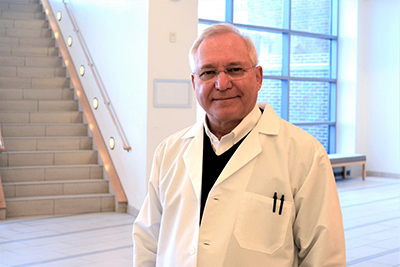
Forty years ago, cervical cancer used to be the leading cause of cancer death for women in the United States. Regular cervical cancer screenings, what patients know as Pap test (or Pap smear), changed that.
This year, just a little more than 14,400 cases of invasive cervical cancer will be diagnosed. In comparison, an estimated 281,550 women will be diagnosed with breast cancer in 2021, according to The American Cancer Society.
“Cervical cancer is a solved problem for a few reasons,” shares Matthias Muenzer, MD, obstetrician and gynecologist at Lilac Women’s Health. “It’s caused by a virus that can be prevented. And, it’s a very slow-growing cancer. Regular cervical exams identify changes to the cervix – before it becomes cancer.”
Dr. Muenzer breaks down these reasons – and highlights how you can reduce your risk of cervical cancer.
HPV doesn’t always turn into cancer
The human papillomavirus (HPV) is an infection that can lead to cervical cancer (and other cancers, including head and neck, anus, penis, vagina and vulva). HPV is a very common infection that is spread by sexual contact. There are typically no symptoms with an HPV infection.
“An HPV infection by itself is nothing terrible. Pretty much everyone gets it,” shares Dr. Muenzer. “I tell my patients to think of it as a cold. In 99 percent of the cases, your immune system will fight it off in about a year or so.”
Vaccines can prevent HPV infections
Vaccinations can help reduce your risk of developing an HPV infection. Dr. Muenzer encourages young women and men who have not been vaccinated to ask for one of the newer HPV vaccines.
“There are more than 150 types of HPV viruses and most of them do not cause cancer. The newest vaccines protect against the nine strains most likely to turn into cancer,” he explains.
The Centers for Disease Control and Prevention (CDC) recommends the HPV vaccine for children ages 11 or 12. Everyone 26 years and younger is also encouraged to be vaccinated.
Cervical cancer is a slow-growing cancer
It takes an average of 10-14 years for an HPV infection to turn into cancer. During that time, noticeable changes can be found in the cervix.

“There are no outward symptoms of cervical cancer when it’s in its early stages,” states Dr. Muenzer. “Symptoms only appear when cancer has become advanced, making regular Pap tests even more important.”
Symptoms of advanced cervical cancer may include:
- Abnormal vaginal bleeding
- Unusual vaginal discharge
- Pain during sex
- Pelvic pain
Fortunately, cervical screenings like Pap tests, allow for regular opportunities to identify early changes and plan for appropriate procedures, if needed.
“There are several stages of pre-cancer before you even get to cervical cancer,” Dr. Muenzer explains. “The first changes are detected during a routine Pap test. Results will come back abnormal, and we have many steps we can take to keep those abnormal cells from developing into cancer.”
If you have an abnormal Pap test result, your doctor will collect more cells from your cervix to be analyzed at a lab. Typically, one of two things will happen after that biopsy:
- Results may show a mild abnormality, which typically indicates an HPV infection. Your doctor may recommend having a Pap test in six to 12 months to see if your body clears the infection during that time.
- Results show an abnormality. Your doctor may recommend an in-office procedure, called loop electrosurgical excision procedure (LEEP). This quick and easy procedure removes all abnormal cells from your cervix. No general anesthesia is required, and you will go home immediately after the procedure.
“Again, it’s important to remember that ‘abnormal’ doesn’t mean cancer in these cases,” he reassures. “It simply indicates that there are cells in the cervix that may turn into cancer.”
Regular Pap tests keep you healthy
It’s clear that regular cervical cancer screenings are key to preventing an HPV infection develop into cervical cancer. These include Pap tests and HPV tests.
Currently, the American College of Obstetricians and Gynecologists (ACOG) recommends the following cervical cancer screening guidelines:
- Women who are 21 to 29 should have a Pap test every three years
- Women ages 25 to 29 can have an HPV test alone, but Pap tests are preferred
- Women ages 30 to 65 have three options for cervical cancer screenings:
- Pap test and HPV test every five years
- Pap test alone every three years
- HPV testing alone every five years
Dr. Muenzer also cautions women to not skip their Ob/Gyn appointments in their “off” years of cervical cancer screening.
“Your annual appointment allows us to discuss your reproductive health, sexual health, and periods,” he states. “Really, it’s an opportunity to share any questions or concerns in a safe, open, and caring environment.”
Dr. Muenzer and the team of experienced Ob/Gyns at Lilac Women’s Health offer women’s health services for patients of all ages. Providing you proven and expert guidance, they’ll help you feel comfortable, safe and empowered when it comes to your health.
Call (603) 335-6988 to schedule your appointment with Dr. Muenzer. He is currently accepting new patients.